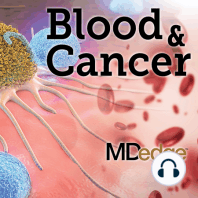21 min listen

ASCO 2020: Practice-changing studies in breast, lung, colorectal, and other cancers
FromBlood & Cancer
ASCO 2020: Practice-changing studies in breast, lung, colorectal, and other cancers
FromBlood & Cancer
ratings:
Length:
42 minutes
Released:
Jun 11, 2020
Format:
Podcast episode
Description
What were the practice-changing studies presented at the 2020 ASCO Annual Meeting? Podcast host David H. Henry, MD, and retired oncologist Alan P. Lyss, MD, reviewed 12 studies and assessed their potential impact on treatment. Breast cancer Three-year follow-up of neoadjuvant chemotherapy with or without anthracyclines in the presence of dual HER2-blockade for HER2-positive breast cancer (TRAIN-2): A randomized phase III trial. (Abstract 501) The addition of anthracyclines did not improve event-free or overall survival. The results suggest patients can avoid the toxicities of anthracycline regimens without compromising efficacy, Dr. Henry said. KEYNOTE-355: Randomized, double-blind, phase III study of pembrolizumab + chemotherapy versus placebo + chemotherapy for previously untreated locally recurrent inoperable or metastatic triple-negative breast cancer. (Abstract 1000) Pembrolizumab improved responses, particularly in patients with higher PD-L1 expression. Dr. Lyss noted that pembrolizumab was combined with a “broad range” of chemotherapy regimens in this study. A randomized phase III trial of systemic therapy plus early local therapy versus systemic therapy alone in women with de novo stage IV breast cancer: A trial of the ECOG-ACRIN Research Group (E2108). (Abstract LBA2) Early local therapy did not improve disease-free survival or overall survival. “We probably should not be recommending planned treatment for the intact primary tumor in most women who have stage IV breast cancer,” Dr. Lyss said. Bladder cancer Maintenance avelumab + best supportive care (BSC) versus BSC alone after platinum-based first-line (1L) chemotherapy in advanced urothelial carcinoma (UC): JAVELIN Bladder 100 phase III interim analysis. (Abstract LBA1) Avelumab maintenance prolonged overall survival, although 12% of patients discontinued the treatment due to toxicity. Because avelumab “meaningfully prolongs overall survival … using it upfront makes a lot of sense,” Dr. Lyss said. Colorectal cancer Pembrolizumab versus chemotherapy for microsatellite instability-high/mismatch repair deficient metastatic colorectal cancer: The phase 3 KEYNOTE-177 study. (Abstract LBA4) Pembrolizumab improved responses and progression-free survival. All patients with colorectal cancer should be tested for microsatellite instability-high status “because these results really do influence practice immediately,” Dr. Lyss said. He suggested that pembrolizumab should probably be used as first-line treatment for these patients even though overall survival results are not yet available. Short-course radiotherapy followed by chemotherapy before TME in locally advanced rectal cancer: The randomized RAPIDO trial. (Abstract 4006) Short-course radiotherapy followed by consolidative chemotherapy and surgery significantly reduced the rate of treatment failure. Dr. Lyss called the pathologic complete response rate “impressive” and said it may contribute to a higher rate of rectal preservation. A randomized phase II/III trial comparing hepatectomy followed by mFOLFOX6 with hepatectomy alone for liver metastasis from colorectal cancer: JCOG0603 study. (Abstract 4005) There was no improvement in overall survival with mFOLFOX6. “The take-home to me … is this is probably not a necessary strategy and certainly not standard of care,” Dr. Henry said. Hodgkin lymphoma KEYNOTE-204: Randomized, open-label, phase III study of pembrolizumab (pembro) versus brentuximab vedotin (BV) in relapsed or refractory classic Hodgkin lymphoma (R/R cHL). (Abstract 8005) Pembrolizumab improved progression-free survival. Dr. Henry marveled that pembrolizumab bested brentuximab vedotin, which previously produced impressive results in patients with relapsed/refractory Hodgkin lymphoma. Lung cancer Nivolumab + ipilimumab versus platinum-doublet chemotherapy as first-line treatment for advanced non-small cell lung cancer: Three-year update from CheckMate 227 Part 1. (Abstract 9500) Nivolu
Released:
Jun 11, 2020
Format:
Podcast episode
Titles in the series (100)
2019 drug approvals in hematology-oncology: , of the University of Pennsylvania, Philadelphia, joins the podcast to discuss noteworthy drug approvals in hematology-oncology in 2019. Dr. Mintzer and Blood & Cancer host, , of Pennsylvania Hospital, Philadelphia, discuss what these new... by Blood & Cancer